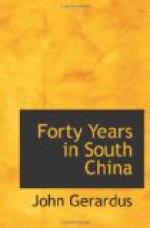“The question whether there is any way by which this people can be made a reading people, especially by which the Christians may be put in possession of the Word of God, and be able to read it intelligently for themselves, has occupied much thought of the missionaries here. At present most of the church members have no reading for the Sabbath and for private meditation. They may have family worship, but they cannot at their worship read the Holy Scriptures. Some of us are now trying an experiment whether by means of the Roman alphabet the Sacred Scriptures and other religious books may not be given to the Christians and to any others who cannot read, but who take enough of an interest in Christianity to desire to read the Scriptures for themselves. By the use of seventeen of these letters we can express every consonant and vowel sound in the Amoy dialect, and by the use of a few additional marks we can designate all the tones. Dr. James Young, an English Presbyterian missionary physician, has commenced teaching the colloquial, as written with the Roman alphabet, in his school, a school formerly under the care of Mr. Doty. From his present experience he is of opinion that boys who are at all apt in acquiring instruction, in less than three months may be prepared for reading the Scriptures, with understanding. I have a class of three or four adults an hour an evening four evenings in the week, receiving instruction in the colloquial. They have taken some half dozen lessons and are making good progress. At present we have no printed primers or spelling-books, and are compelled to teach principally by blackboard. We are of opinion that almost every member of the church can soon learn to read by this system. Arrangements have been made to print part of the history of Joseph in colloquial. These are but experiments. If they succeed according to our present hope, it may be worth while to have the whole Bible and other religious books printed in this manner. A little more experience will enable us to speak with more confidence for or against the plan.”
“Dec. 23. Yesterday morning my chapel was opened, according to appointment. I preached to the people my first regular sermon from the text, ‘There is one God and one Mediator,’ etc. The room was crowded. It will seat about one hundred comfortably.”
CHINESE SENSE OF SIN.
March 17, 1851. To his brother, Goyn.
“I think the Chinese are very different in their religious feelings from many other (perhaps from the most of other) heathen people. We have often heard of the great sacrifices which the heathen of India will make and the great sufferings they will impose on themselves in order to make atonement for their sins and appease the anger of the gods. There may occasionally be something of the kind among the Buddhists of China. But I rather suppose that where there are any self-mortifications imposed




